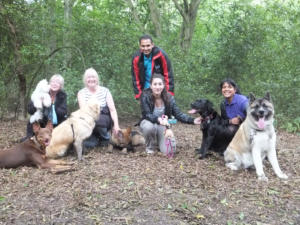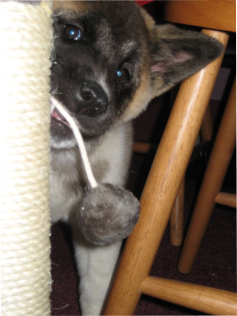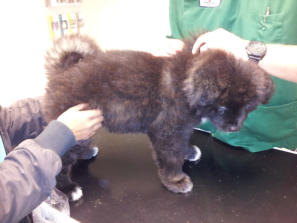

© copyright Dog-Panions 2025
DOG-Panions MOB: 07807 377920






Socialisation:
Socialisation is one of the most important aspects of
your dogs life, this does not just mean meeting dogs
in puppy class for 6 weeks, it means that for the
early part of their lives they should be exposed to as
many different sights sounds and interactions with
other dogs of all shapes and sizes and plenty of
people, of different ages sexes and body types. This
helps them become accustomed to the strange
human world they are going to spend their lives in.
Socialisation does not always have to be a class, it can be out for a walk with a group of friends
- what better way to let dogs get together - and it helps keep you fit too!
Bite Inhibition:
Puppies need to learn to inhibit their
strength of bite, before their jaws develop
and adult teeth push through, becoming
strong enough to cause damage. Interacting
with other puppies helps them learn how
and when using their teeth is appropriate.
Barking: YES DOGS BARK!!!!!
If you do not want a dog constantly barking at everything and everyone - teach them when to
stop barking on your instruction - shouting at them “STOP IT” dose not help! Teach them that
quiet is good.
Jumping Up:
Dogs love to jump up to say hello and see what’s going on up there. Its cute when their little -
but not so much when they are fully grown and bowl you over! teach them from day one that
sitting calmly on the floor is the best way to get kisses, cuddles and treats.
Pulling on Lead
Dogs naturally walk faster than us, there on all fours so they go twice the speed - do we want to
run after them or have our arms pulled tight? NO so teach them how to keep to your speed.
Teach them that they will get to where they want to go - as long as they go at your pace - start
when their little - as although it may not be a problem when they are a few kilos, wait until they
are fully grown and are dragging you down the street!
Boredom:
“The devil makes work for idle paws…..”
All dogs regardless of size, breed and age need physical and
mental stimulation. Letting a dog of any breed sniff out things
on their walks is a good way for them to explore their
surroundings ,communicate with other animals and use their
amazing scent skills, burning extra calories making the walk
much more productive as it requires concentration so burns
calories.
Dogs are very smart, inquisitive and have bags of energy.
They WILL find themselves something to do, if you don’t arrange activities for them .
And that something might not always meet with your approval!
You could utilise activity toys which come in all different shapes , sizes and levels of complexity.
They are great for hiding treats in, which will keep the dog concentrating and occupied while
trying to get the food out.
Going to the vets:
This doesn’t have to be a scary - from day one arrange
visits to your vet just to say hello! Don’t make their first
visit a vaccination or a micro-chip injection.
When any treatment is needed, your puppy already has
the experience of the place, table, smells and familiarity
with the vet and staff, making it it easier to cope -
reducing the risk of them lashing out through fear.





Learning how to communicate with other dogs is a skill we need to expose our puppies to, as we
have taken them away from their parents and litter mates too early, they will need to learn how to
behave around dogs at home, in the park, at class or on the street.
This will help keep them safe around unfamiliar dogs.
Here - the puppy has pushed his luck with the older dog
and is being warned to calm down, now if he sees this in
the park he will have a better idea of what not to do.





















